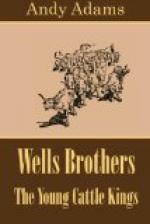“I’ll see him to-night,” said the foreman, calling after the vehicle.
Forrest was picked up, and they returned to town. The fame of wicked Dodge never interfered with the transaction of business, its iniquity catering largely to the rabble.
“I’ll take Joel with me,” said the drover to Forrest, “and you look after the horses and hang around the hotel. Dud Stoddard is almost sure to look me up, and if you meet him, admit that we looked over his cattle again. I want him to hound me into buying that herd.”
Joel’s taciturn manner stood him in good stead. He was alert to all that was passing and, except with Mr. Lovell, was reticent in the extreme. The two strolled about the streets during the evening hours, and on returning to the hotel rather late, Dudley Stoddard was awaiting the old drover. There was no prelude to the matter at issue, and after arranging with other sellers to receive the following day, Mr. Lovell led the way to his room.
“This is one of the Wells Brothers,” said the old cowman, presenting Joel; “one of the boys who watered the drive on the Beaver this summer. I was up on his ranch about a month ago, and gave him a good scolding for not stocking his range somewhere near its carrying capacity. He’s the buyer I had in view for your three-year-olds. You offered me the herd, on time, and at satisfactory prices. I can use two thousand of the twos, and Wells Brothers will take the remainder, and we’ll turn you afoot. Say so, and your herd is sold.”
“Well,” said Mr. Stoddard, somewhat embarrassed, “I don’t happen to know the Wells Brothers—and I usually know men when I extend them a credit. This boy—Well, I’m not in the habit of dealing with boys.”
“You and I were boys once and had to make our start,” testily replied Mr. Lovell, pacing the room. “The Wells Brothers are making the fight that you and I were making twenty years ago. In our early struggles, had some one stood behind us, merely stood behind us, it might have been different with us to-day. And now when I don’t need no help—Dud, it don’t cost much to help others. These boys have proven themselves white, to yours and to my men and to yours and to my cattle. Is there nothing we can do?”
Mr. Stoddard turned to the old drover. “I’ll renew my last offer to you. Take the herd and sell these boys the older cattle and remnants. You know the brothers—you know their resources.”
“No!” came the answer like a rifle-shot.
“Then, will you stand sponsor—will you go their security?”
“No! These boys can’t send home for money nor can’t borrow any. Their only asset is their ability to hold and mature cattle. Last winter, the most severe one in the history of the West, they lost two per cent of their holdings. Neither you nor I can make as good a showing on any of our ranges. Dud, what I’m trying to do is to throw on this boy’s shoulders the responsibility of paying for any cattle he buys. At his age it would be wrong to rob him of that important lesson. Let’s you and I stand behind him, and let’s see to it that he makes the right effort to protect his credit.”




